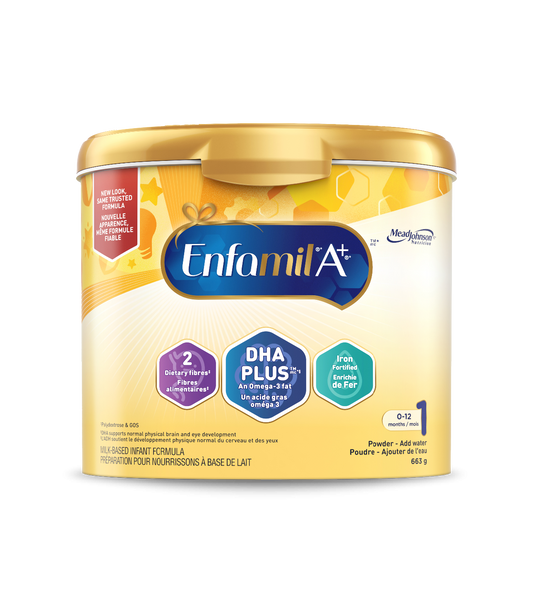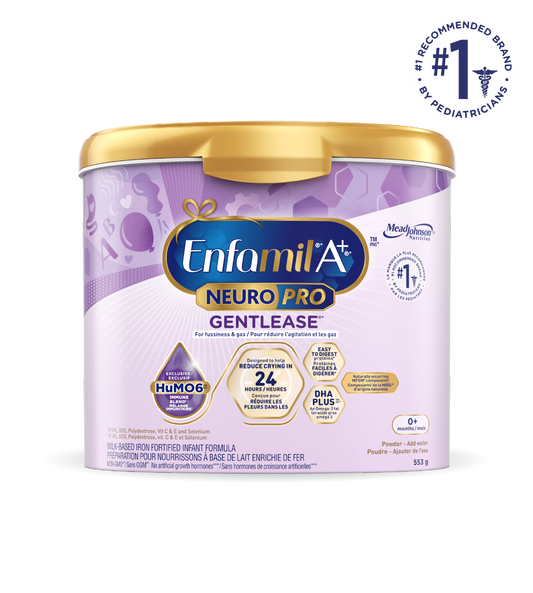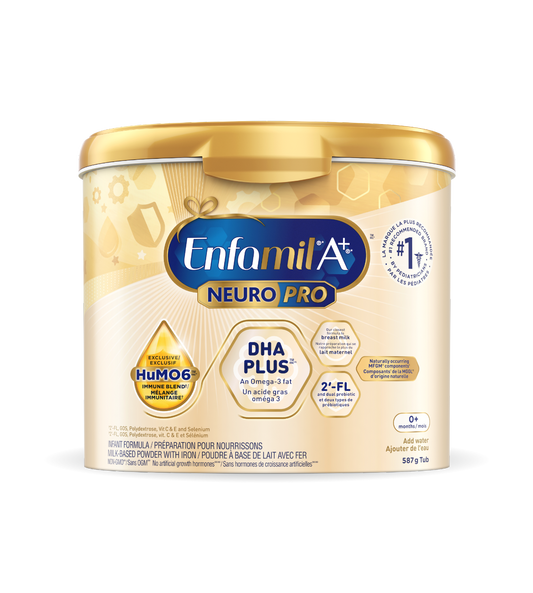With proper nutrition and care, your baby will grow and develop at a rapid rate during his first year. Here are some important first year nutritional guidelines and considerations to best promote the healthy development and safety of your baby.
0-6 Months
During this time, your baby will draw his nutrients from breast milk or iron-fortified infant formula. A daily Vitamin D supplement of 400 IU (10 μg) is recommended for breastfed infants until they reach one year of age or their diet provides an adequate amount of Vitamin D. If you are breastfeeding, ensure that you are eating a healthy diet rich in essential vitamins and minerals as well as DHA (an Omega-3 fat). DHA helps to support normal brain and eye development in your baby. Breastfed babies also tend to have softer, looser stools than formula fed babies.
Learn more about infant nutrition.
It is not recommended to offer your baby solids before 6 months of age. If you do, your baby may:
- Have lower iron levels.
- Have a diet low in protein, fat and other important nutrients.
- Breastfeed less often causing your milk supply to diminish.
- Stop breastfeeding too early.
- Not receive all the benefits of breast milk such as protection from illness and allergies.
6 - 9 Months - Starting Solids
At 6 months, most babies cannot get everything they need from breast milk or formula alone.The Canadian Paediatric Society, Dietitians of Canada and Health Canada recommend introducing iron-rich foods at 6 months of age. Iron is essential for physical and mental growth, and more is needed as your baby ages to avoid iron deficiency anemia. Iron-fortified infant cereal is a good place to start. Once your baby has accepted the new texture and taste, you can move on to pureed meats and/or fruits and vegetables, such as bananas, peaches, peas and carrots. Introduce new foods gradually, one at a time.
Learn more about introducing solid food.
9 - 12 Months - Cow's Milk
This is the optimal time to introduce cow’s milk into your baby's diet. Doing so any earlier might pose significant developmental risks, as it does not contain the proper amount of iron that a younger baby needs, plus it contains higher levels of proteins and some minerals that are not appropriate for younger babies.You may introduce pasteurized whole cow’s milk from 9-12 months and continue up until he is at least 2 years of age.
See What Other Nutrients Your Baby Should Be Getting Every Day
Other Considerations
- Babies and children don't need to drink juice. To much juice, especially apple juice, can cause diarrhea. It can fill up small stomachs and decrease your baby's appetite for nutritious foods. Too much juice can also cause early childhood tooth decay.
- When you do offer juice, be sure it is only 100% fruit juice. Always offer it in a cup, as part of a meal or snack. Offer water to babies and young children between meals and snacks if they are thirsty. Limit juice to 120 to 180 mL (4 to 6 oz.) per day.
Avoid tea.
- The tannins in tea inhibit your baby's ability to absorb iron, which can put him at risk for anemia. And the caffeine in tea interferes with calcium absorption, which is critical to bone building.
Avoid honey in the first year.
- Honey or baked foods containing honey should be avoided until 1 year or age. Honey can cause botulism, a serious type of food poisoning.
Pinpoint potential choking hazards
Mash or puree foods so that your baby can swallow them easily. Whole or chunky foods can get caught in his windpipe, blocking air from his lungs.
Foods to avoid:
- Chunks of hot dogs
- Whole grapes
- Nuts
- Popcorn
- Chips
- Lumps of peanut butter
- Pieces of hard, raw vegetables
- Hard candy or chewy candy like gummy bears or jelly beans
Avoid nitrates.
Processed meats and even some drinking water contain nitrates, which may pose a potential health hazard to your baby.
Foods to avoid:
- Bacon
- Bologna
- Ham
- Hot dogs
- Sausage
- Nitrate-contaminated drinking water, such as some well water
Monitor sugar or salt intake.
Additional sugar and salt are unnecessary in your baby's diet and do not represent sound nutrition. By flavouring with sugar and salt, you will inhibit your child from experiencing the natural flavour of different foods, which might lead to poor or difficult eating habits later on.










